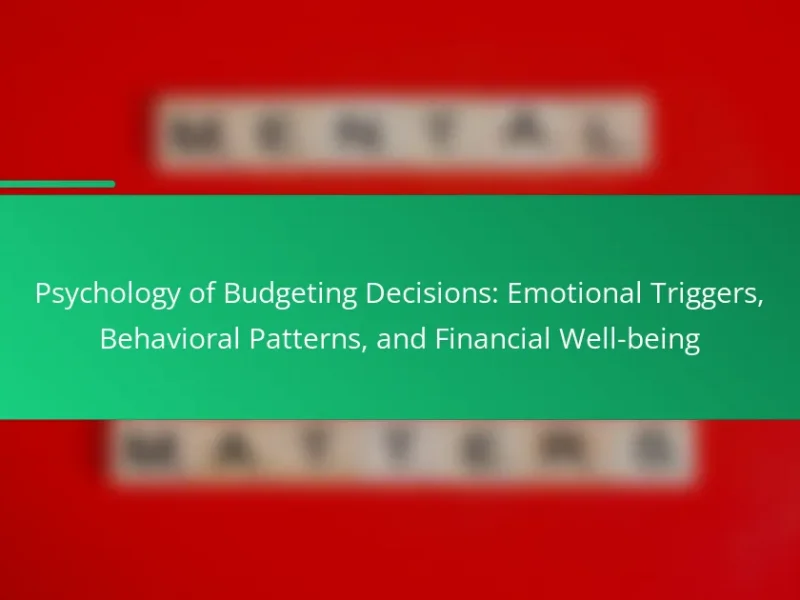Understanding the psychology of money is crucial for making informed financial decisions and enhancing overall well-being. Emotional triggers influence spending behaviours and perceptions of value. Decision-making biases, such as loss aversion and overconfidence, can lead to irrational choices. Recognising these factors is essential for improving financial outcomes and mental health.

What emotional triggers influence money decisions?
Emotional triggers significantly influence money decisions by affecting how individuals perceive value and risk. Factors such as fear, desire, and social pressure shape financial behaviours. For instance, fear of loss can lead to overly cautious investment choices, while desire for status may drive unnecessary spending. Recognising these triggers enhances financial well-being and informed decision-making.
How do psychological factors shape financial choices?
Psychological factors significantly influence financial choices by affecting emotions and perceptions. Emotional triggers, such as fear and excitement, can lead to impulsive decisions, while cognitive biases, like loss aversion, may cause individuals to avoid risks. Understanding these psychological elements enhances financial well-being by promoting informed decision-making and better financial outcomes.
What role does stress play in financial decision-making?
Stress significantly impacts financial decision-making by influencing emotions and cognitive biases. High stress can lead to impulsive choices, decreased risk assessment, and avoidance of financial planning. For instance, individuals under stress may prioritise immediate needs over long-term goals, resulting in poor financial outcomes. Research indicates that stress can impair judgement, causing reliance on heuristics rather than rational analysis. Understanding these emotional triggers is crucial for improving financial well-being and making informed decisions.
How can anxiety affect spending habits?
Anxiety can significantly impact spending habits by triggering impulsive purchases as a coping mechanism. Emotional triggers associated with anxiety often lead individuals to seek immediate gratification through spending, which can result in financial instability. Studies show that anxious individuals are more likely to make unplanned purchases, reflecting a decision-making bias influenced by their emotional state. Over time, this behaviour can undermine financial well-being and exacerbate feelings of anxiety, creating a detrimental cycle.
What is the impact of fear on investment choices?
Fear significantly impacts investment choices by causing irrational decision-making and risk aversion. Investors often react to market volatility with heightened anxiety, leading them to make impulsive decisions, such as selling assets at a loss. This emotional response can overshadow logical analysis, resulting in missed opportunities for long-term gains.
Research indicates that fear can trigger biases like loss aversion, where the pain of losing money outweighs the pleasure of gaining it. Such biases can lead to conservative investment strategies, limiting potential returns. Understanding these psychological triggers is essential for improving financial well-being and making more informed investment choices.

What are common decision-making biases related to money?
Common decision-making biases related to money include loss aversion, overconfidence, and anchoring. Loss aversion leads individuals to prefer avoiding losses over acquiring equivalent gains. Overconfidence can result in unrealistic financial expectations. Anchoring affects decisions based on initial information, often skewing judgement. Understanding these biases enhances financial well-being by promoting better decision-making.
How does loss aversion affect financial behaviour?
Loss aversion significantly impacts financial behaviour by causing individuals to prioritise avoiding losses over acquiring equivalent gains. This bias leads to overly cautious investment strategies, resulting in missed opportunities for growth. Research indicates that the pain of losing money is psychologically twice as powerful as the pleasure of gaining the same amount, influencing decisions like holding onto losing stocks too long or avoiding riskier but potentially rewarding investments. Understanding this emotional trigger is essential for improving financial well-being and making more rational choices.
What is the anchoring bias in financial decisions?
The anchoring bias in financial decisions occurs when individuals rely too heavily on the first piece of information encountered, influencing their subsequent judgements. This bias leads to irrational decision-making, as initial figures or data points can skew perceptions of value. For example, if a person sees a stock priced at £100, they may anchor their expectations around that figure, disregarding future performance or market conditions. Understanding this bias is crucial for improving financial well-being, as it highlights the need for critical evaluation of information rather than automatic reliance on initial impressions.
How does overconfidence manifest in investment strategies?
Overconfidence in investment strategies often leads to excessive risk-taking and poor decision-making. Investors may overestimate their knowledge and ability to predict market movements, resulting in suboptimal portfolio choices. This bias can manifest through high trading volumes, frequent adjustments to investment positions, and neglect of fundamental analysis. Research indicates that overconfident investors tend to underperform compared to their more cautious counterparts, highlighting the importance of emotional triggers in financial decision-making.

How does financial well-being relate to mental health?
Financial well-being significantly impacts mental health by influencing stress levels and overall emotional stability. Poor financial situations often lead to anxiety, depression, and feelings of inadequacy. Conversely, a stable financial status can enhance self-esteem and reduce mental health issues. Research indicates that individuals with higher financial well-being report better mental health outcomes. Financial literacy also plays a crucial role, as it empowers individuals to make informed decisions, ultimately promoting both financial and mental well-being.
What are the signs of financial stress?
Signs of financial stress include anxiety about money, difficulty paying bills, and changes in spending habits. Individuals may experience emotional triggers like fear or guilt when making financial decisions. Other indicators are increased debt levels, avoidance of financial discussions, and a sense of helplessness regarding financial situations. Understanding these signs can enhance financial well-being and improve decision-making.
How can financial literacy improve mental well-being?
Financial literacy enhances mental well-being by reducing anxiety and fostering confidence in financial decisions. Understanding emotional triggers and decision-making biases can lead to better financial management. This knowledge empowers individuals to make informed choices, alleviating stress associated with financial uncertainty. Improved financial well-being correlates with higher overall life satisfaction and emotional stability.

What unique attributes influence the psychology of money?
Unique attributes influencing the psychology of money include emotional triggers, cognitive biases, cultural influences, and personal experiences. Emotional triggers, such as fear or greed, significantly affect financial decisions. Cognitive biases, like loss aversion, can lead to irrational choices. Cultural influences shape attitudes towards wealth and spending. Personal experiences, including upbringing and past financial situations, further mould individual perspectives on money.
How does cultural background shape financial perceptions?
Cultural background significantly influences financial perceptions by shaping attitudes towards money, spending, and saving. For instance, collectivist cultures may prioritise communal financial support, while individualistic cultures often emphasise personal financial independence. These cultural values affect emotional triggers related to money, such as fear of loss or desire for security. Understanding these cultural nuances can enhance decision-making and promote financial well-being.
What role do personal values play in money management?
Personal values significantly influence money management by shaping spending habits and financial decisions. Values, such as security, freedom, or social responsibility, guide individuals in prioritising financial goals. For instance, someone valuing security may prioritise savings and investments, while another valuing experiences might spend on travel. This alignment between values and financial behaviour impacts overall financial well-being, as it fosters satisfaction and reduces stress. Understanding these emotional triggers can enhance decision-making and promote healthier financial habits.

What rare traits can significantly impact financial decision-making?
Rare traits such as overconfidence, loss aversion, and emotional reasoning can significantly impact financial decision-making. Overconfidence leads individuals to underestimate risks, often resulting in poor investments. Loss aversion causes a stronger emotional response to losses than to gains, influencing risk-averse behaviours. Emotional reasoning can cloud judgement, making decisions based on feelings rather than data. Understanding these traits can enhance financial well-being by promoting more rational decision-making.
How do extreme financial events alter decision-making processes?
Extreme financial events significantly impact decision-making processes by triggering emotional responses and cognitive biases. These events can lead to heightened stress, fear, and anxiety, which distort rational thinking. As a result, individuals may make impulsive financial choices, driven by immediate emotional reactions rather than long-term planning. Research indicates that during financial crises, people often exhibit loss aversion, prioritising the avoidance of losses over potential gains. This shift in focus can hinder sound financial judgement and promote conservative behaviours, such as excessive saving or risk aversion. Understanding these psychological dynamics is crucial for improving financial well-being and decision-making strategies.
What is the influence of social comparison on spending habits?
Social comparison significantly influences spending habits by shaping individuals’ perceptions of financial success. People often gauge their financial choices against those of peers, leading to increased consumption to match perceived social standards. This behaviour can result in impulsive buying and overspending, driven by the desire to maintain social status. Research indicates that individuals who frequently engage in social comparison are more likely to experience financial stress and dissatisfaction. Understanding these emotional triggers can enhance financial well-being and promote healthier spending behaviours.

What are best practices for improving financial decision-making?
To improve financial decision-making, recognise emotional triggers and biases. Awareness of these psychological factors enhances financial well-being.
First, identify emotional triggers that influence spending. For example, stress may lead to impulsive purchases. Second, understand common decision-making biases like loss aversion, which can skew risk assessment. Third, practice mindfulness to mitigate emotional reactions during financial choices.
Additionally, set clear financial goals to provide direction and reduce anxiety. Regularly review decisions to learn from past experiences, reinforcing better future choices.
Implementing these strategies fosters a proactive approach, ultimately leading to improved financial outcomes.
How can mindfulness techniques enhance financial choices?
Mindfulness techniques can significantly enhance financial choices by promoting emotional awareness and reducing impulsive decision-making. Practicing mindfulness helps individuals recognise emotional triggers that lead to poor financial decisions, such as anxiety or excitement. By cultivating a mindful approach, people can better evaluate their biases, leading to more informed and rational choices. Research indicates that mindfulness improves focus and self-control, which are crucial for effective budgeting and saving. Additionally, incorporating mindfulness into financial planning fosters a sense of well-being, ultimately contributing to long-term financial stability.
What strategies can mitigate the effects of biases in spending?
To mitigate the effects of biases in spending, individuals can adopt several strategies. First, setting a strict budget can create awareness of spending habits and limit impulsive purchases. Second, practicing mindfulness helps recognise emotional triggers that lead to biased decisions. Third, utilising automated savings tools can reduce the temptation to overspend. Finally, seeking accountability through financial advisors or peer support can provide external perspectives to counteract biases.
How can individuals cultivate a healthier relationship with money?
Individuals can cultivate a healthier relationship with money by understanding their emotional triggers and decision-making biases. Recognising how emotions influence spending can lead to better financial choices. Research shows that awareness of these psychological factors enhances financial well-being. Techniques such as mindfulness and budgeting can support this process. Additionally, engaging with financial education resources, like the “Psychology of Money” PDF, can provide valuable insights into improving financial habits and attitudes.


